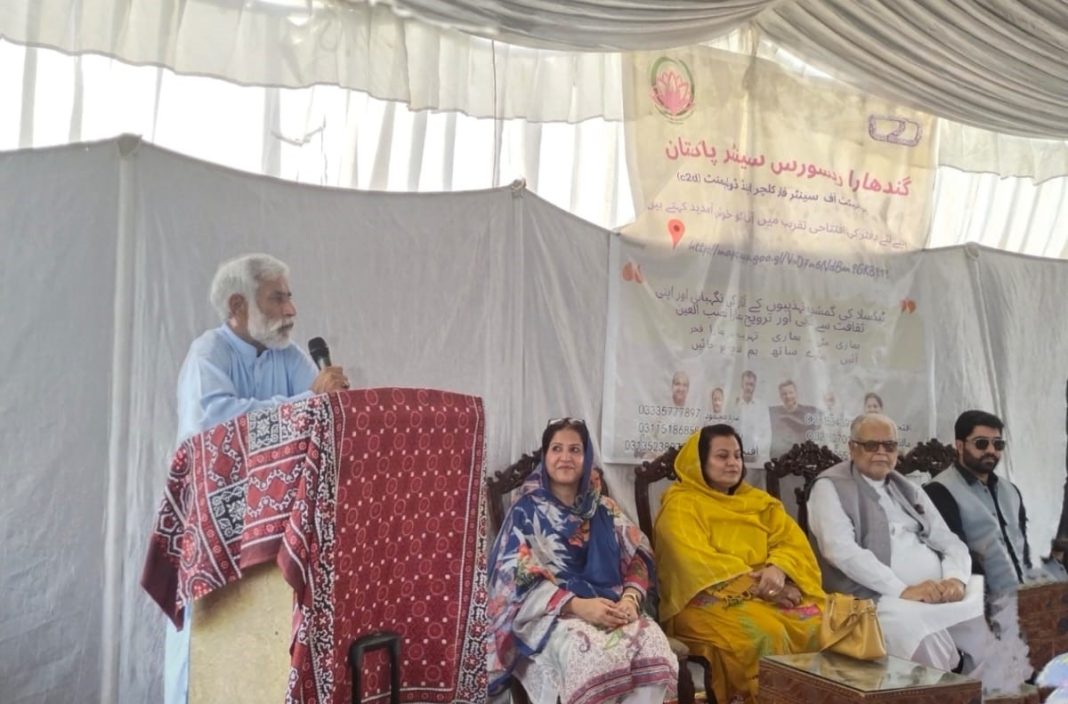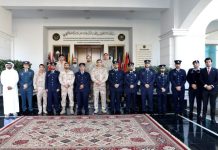By Adnan Rafique
ISLAMABAD: The Gandhara Resource Center (GRC) Pakistan, grass root project of the Centre for Culture and Development (C2D) has inaugurated its new office at Taxila Gardens to advance its mission of research and heritage exploration of over 3,000 years old human civilizations nestled in the nook and corner of the ancient city of Taxila.
An inauguration ceremony of the new GRC Pakistan office was held here at Taxila Gardens under the auspices of Taxila Chaupal which is a subsidiary of the GRC. Project Director Taxila Gardens, Naqash Ahmed was the guest of honour, Former Director General of the Agency for Barani Areas Development (ABAD) and Associated with NRSP, Malik Muhammad Fateh Khan and former Sub-divisional Forest Officer, Dr Memoona Wali Muhammad among others participated in the inaugural ceremony.
GRC Pakistan Core Committee Member and Director C2D, Sarah Mehmood in her opening remarks welcomed all the guests and participants and briefly explained the vision of the Center. GRC Pakistan inaugurates new office to advance research, heritage exploration in Taxila She said GRC Pakistan was known as a C2D project being piloted at Taxila focussed on Gandhara civilization that encompassed a huge area from Afghanistan to Pakistan.
“GRC as a pilot project is an effort to kick start a special research to document Taxila’s history,” she added. Commending the Taxila Gardens authorities, she said the administration helped the GRC team a lot in establishing the project as Naqash Ahmed the Project Director of Taxila Gardens extended his full support in that regard.
“GRC will collaborate with universities like UET and HITECH as MoUs have been signed to introduce Taxila heritage to the youth and encourage them to play their role in its protection,” Sarah Mehmood said. She added that the Centre had also engaged students in research on architectural techniques of over 3,000-year-old civilization which was still intact and surviving the pressures of time.
Buddhism had a great role in Gandhara civilization whereas thousands of tourists come to Taxila every year, she said.
The Centre had a qualified team of experts that possessed diverse backgrounds and linkages to the history of Gandhara. She ended that Executive Director (ED) C2D Dr Nadeem Omar Tarar had made all the efforts to make GRC Pakistan recognized all around as it had emerged as a brand in Taxila.
Project Manager of GRC Pakistan Malik Aushtar Ali said the ancient Takshala University of Taxila used to accommodate 10,000 students and had 5,000 members of faculty 3,000 years back when the surrounding areas were sunk in oblivion due to ignorance. He added that the people from Central Asia, Greece, Egypt and Europe in ancient times used to come to study at Taxila University. The Somnath and other ancient universities of the subcontinent were founded by Taxila University Graduates whereas the Zoroastrian Temple in Jandial was the subcontinent’s oldest temple and older than Azerbaijan’s Towers of Silence, he added. Gautama Buddha, the founder of Buddhism had spent his last time in this region, Malik Aushtar Ali said. He mentioned that the artisans wanted to get exposure and export their talent which was the Centre’s mission. Moreover, the POF WAH also held a training workshop for Artisans of Gandhara whereas the GRC Pakistan in collaboration with UNESCO also held the Gandhara Orange festival to promote the local cultural artifacts and heritage history. The GRC Pakistan, he said also wanted to promote agricultural products of the region as well. Team member, GRC Pakistan, Iftikhar Ud Din Siddiqui also welcomed all the guests and thanked them for their participation. He said, “Taxila City has great significance and it’s our mission to pass on its heritage to the young generation.” The connectivity infrastructure in the locality had improved and increased access to protected heritage sites, he said. Former DG ABAD Malik Muhammad Fateh Khan thanked the GRC administration for inviting him. He regretted that the present generation had forgotten its roots in Gandhara civilization. “We would make our efforts in making the youth aware of its roots in Gandhara civilization,” he added. Muhammad Fateh Khan, who is also associated with National Rural Support Programme (NRSP) said that under NRSP initiatives local communities and villages were engaged in awarenesses, advocacy and development. The NRSP would also support GRC in community mobilization and awareness of Gandhara civilization protection. The programme, he said would also support saplings in millions for plantation by GRC Pakistan, he added. Dr Memoona Wali Muhammad, the first Women Forester, Forest Department said the GRC focused on the religion of Buddhism and this religion emphasised research and learning. The Bhuddism era buildings, environment and landscape around inns were green and knowledge-based whereas Bhuddha’s own life also revolved around nature and trees. “I as a woman proved that women can work in forests. Women must unite to educate the coming generation as environmentalists and climate literate,” she said. In the epoch of Bhuddism, water was considered at that time a symbol of purity and clarity whereas it could be purified through trees. Guest of Honour, Naqash Ahmed, Project Director Taxila Gardens in his keynote address said GRC Pakistan was a first-of-its-kind programme. He added that the heritage and history of Taxila was a legacy that should be transferred to the next generation. “We should bring the younger generation out of mobile phones and indulge them in tourism and learning of civilization. A Buddhist quote says that mountains give wisdom when one indulges in them,” he added. “The mission of GRC is a passion and Taxila Gardens will support it in all forms as the Society is establishing all parks in Gandhara architecture style and named its main Park as Gandhara Park due to GRC efforts,” he ended. Taxila Chaupal member, Raja Noor Muhammad Nizami said Taxila had remains of Hinduism, Jainism, and Buddhism. He had visited every nook and corner of Taxila and realized that 95% of its ancient heritage was unexplored. Nizami mentioned that the area had remains of the Ghaznavi Period and the Sikh period of Baba Guru Nanak. “It is a very important area and tourism development can help improve the region and provide huge foreign exchange to the national exchequer,” he added. Other Chaupal members including Pervaiz Khan, Artist, and landscape painter, Riaz Ahmed and Sheikh Salahuddin also addressed the gathering. The guest of honour Project Director Taxila Gardens Naqash Ahmed inaugurated the GRC Pakistan’s office and later planted trees on its premises.




